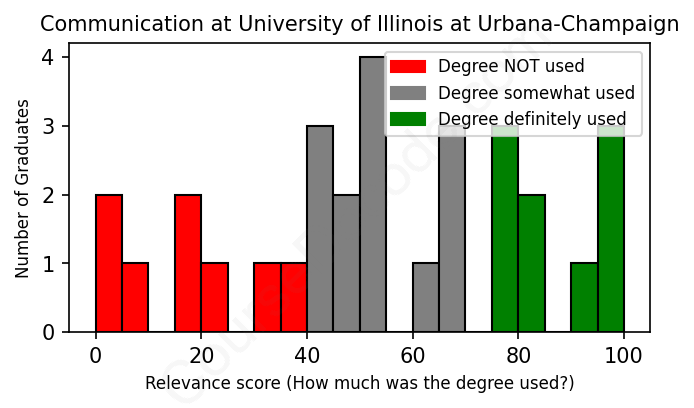
First, some facts. Of the Communication graduates from University of Illinois at Urbana-Champaign we've analyzed , here's how many have used (or NOT used) their degree in their career:

These are estimates based on AI analysis of 30 LinkedIn profiles (see below).
The verdict? Significantly below average. Overall, with an average relevance score of 53%, Communication graduates from University of Illinois at Urbana-Champaign have a much lower likelihood (-14%) of finding work in this field compared to the average graduate across all fields:
And for comparison, here's the chart for all profiles we've looked at across all degrees.
Also, after graduating, only 20% of these graduates have pursued further education other than another Bachelor's degree (such as a Masters degree or other), compared to the average across all profiles of 35%. This suggests a Bachelors degree is enough for most Communication graduates, and it's normal to look for work straight after graduation.
See the details:
|
Relevance score: 68% We think this person has gone into a career only somewhat relevant to their degree. We think this person has gone into a career only somewhat relevant to their degree.
DEGREE INFOGraduated in 2013 from University of Illinois at Urbana-Champaign with a Bachelor of Arts (B.A.) in Communication. No other secondary education since. JOB HISTORY SINCE GRADUATIONAssistant Manager Hollister Co. Jun 2013 - Feb 2014 Nanny  Private Nanny Feb 2014 - Present Licensure and Communications Specialist  Regional Office of Education #35 Sep 2016 - Present ABOUTNo information provided. |
The top 10 most common jobs done by the graduates we've analyzed (ranked most common to least) are:
Here is a visual representation of the most common words in job titles for Communication graduates (this is across all Communication graduates we've analyzed, not just those who went to University of Illinois at Urbana-Champaign):

Looking at the career paths of Communication graduates from the University of Illinois at Urbana-Champaign, it seems like they start off in a variety of entry-level roles mainly focused on communications, marketing, and customer service. For many, the first job after graduation is often something like a customer service representative, marketing intern, or sales role. This initial experience tends to be fairly diverse, with some stepping directly into roles that align closely with their degree, particularly in marketing and media.
As the years go by, especially around the 5 to 10-year mark, there's a notable shift. Many graduates seem to carve out solid careers in fields that leverage their communication skills—like public relations, account and project management, or even editing and content creation. Others have ventured into managerial roles or specialized positions like market analysis or event management. However, not everyone is in a direct line related to Communication, as some have taken jobs in sales or customer service that might not fully utilize their degree. Overall, while there are certainly some successes, there’s a mix of both relevant and unrelated positions, with many finding good opportunities by leveraging their initial roles to branch out into more specialized or managerial positions over time. It's a mixed bag, but with the right moves, many are doing quite well!
Honestly, the Bachelor’s degree in Communication at the University of Illinois at Urbana-Champaign is generally considered to be pretty manageable, especially compared to some of the more technical or science-heavy majors. It focuses a lot on critical thinking, writing, and presentation skills, which can be challenging, but if you enjoy working with people and expressing ideas, you might find it more on the easier side. There’s a good mix of theory and practical application, so if you're motivated and stay on top of your assignments, you should do just fine. Of course, like any degree, it requires effort, but it's not usually viewed as the hardest path you could take!
Most commonly, in the LinkedIn profiles we've looked at, it takes people 4 years to finish a Bachelor degree in Communication.
Looking at the job trajectories of these Communication grads from the University of Illinois, it seems like some have landed pretty solid gigs that likely pay well, while others are still finding their footing. For example, the grad who moved up through positions at EY and then took on an Assistant Director role is probably doing quite well financially, considering those roles typically come with nice salaries. Meanwhile, some others have taken a more unconventional path, like working as a bartender or in smaller companies, which might not bring in as much cash. Basically, it’s a mixed bag—some grads are raking it in, while others are probably still building their way up. Just goes to show, grad school wasn't the only factor; it’s also about the choices you make and the industries you get into after.
Here is a visual representation of the most common words seen in the "about" section of LinkedIn profiles who have a Bachelor degree in Communication (this is across all Communication graduates we've analyzed, not just those who went to University of Illinois at Urbana-Champaign). This may or may not be useful:

Here are all colleges offering a Bachelor degree in Communication (ordered by the average relevance score of their Communication graduates, best to worst) where we have analyzed at least 10 of their graduates: